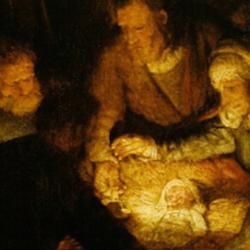In her study of postmodern apocalypticism, Apocalyptic Transformation (xxiii–xxv), Elizabeth Rosen asks what effects secularization has on apocalyptic stories. The most obvious thing is a change in “how the deity is portrayed.” The perfect God of traditional theism is out; “secular deities are often imperfect characters, neither absolutely omniscient and omnipotent, nor absolutely benevolent.” Some writers multiply gods, splitting “traits” of God among characters or conflating deities and devils.
The sense of time changes too: “What we find in the postmodern versions of apocalypse . . . is that the story about the End of Time becomes instead a story about the end of one time.” Rosen sees a reversion to a cyclical understanding of time, and observes, “What is played out more often in postmodern versions is a partial destruction, a surgical strike of sorts, with the result that there occurs a blurring of beginnings and endings.” Postmodern writers resist closure, and so older versions of apocalypse have little appeal.
Finally, there is a shift in the concept of judgment, which “becomes an amorphous and ambiguous concept in postmodern apocalypse. In part this is a result of imperfect deities. These reconceived deities are often soul-searching, Hamlet-like characters. Unlike the God of the Bible, their moral bearings are sometimes unsteady. They are fully aware of, sometimes paralyzed by, the moral complexities of the modern world.” In postmodern apocalypse, it is not at all clear that “objective judgment is possible.”
The first and last of these are secular truncations of traditional apocalypse. The second, however, is much closer to biblical apocalypse than Rosen realizes. Scripture doesn’t teach a cyclical view of time, but the Apocalypse is mostly about the end of an epoch of time, rather than the End of Time.











